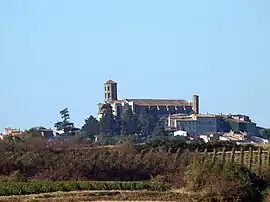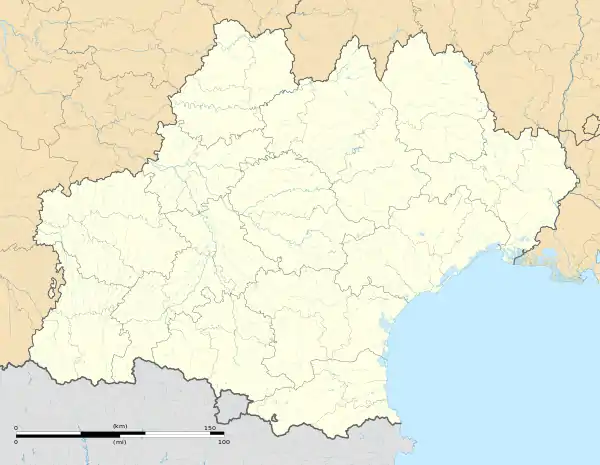Montréal | |
|---|---|
 Church of St Vincent, given collegiate status in the 14th century | |
.svg.png.webp) Coat of arms | |
Location of Montréal | |
 Montréal  Montréal | |
| Coordinates: 43°12′N 2°09′E / 43.2°N 2.15°E | |
| Country | France |
| Region | Occitania |
| Department | Aude |
| Arrondissement | Carcassonne |
| Canton | La Malepère à la Montagne Noire |
| Government | |
| • Mayor (2020–2026) | Bernard Breil[1] |
| Area 1 | 55.21 km2 (21.32 sq mi) |
| Population | 2,048 |
| • Density | 37/km2 (96/sq mi) |
| Time zone | UTC+01:00 (CET) |
| • Summer (DST) | UTC+02:00 (CEST) |
| INSEE/Postal code | 11254 /11290 |
| Elevation | 117–443 m (384–1,453 ft) |
| 1 French Land Register data, which excludes lakes, ponds, glaciers > 1 km2 (0.386 sq mi or 247 acres) and river estuaries. | |
Montréal (French pronunciation: [mɔ̃ʁe.al] ⓘ; Languedocien: Montreal) is a commune just west of Carcassonne in the Aude department, a part of the ancient Languedoc province and the present-day Occitanie region in southern France.
History
In 1206 Montréal was the site of debates between Catholics and Cathars, a sect of Christianity whose beliefs ran contrary to the teachings of the Catholic Church. These debates were initiated by a Spanish bishop Diego of Osma and his canon, the future Saint Dominic, as part of Pope Innocent III's program to convert the Cathars in the area to Catholicism.
Population
| Year | Pop. | ±% |
|---|---|---|
| 1962 | 1,761 | — |
| 1968 | 1,678 | −4.7% |
| 1975 | 1,588 | −5.4% |
| 1982 | 1,535 | −3.3% |
| 1990 | 1,546 | +0.7% |
| 1999 | 1,672 | +8.2% |
| 2008 | 1,957 | +17.0% |
See also
References
- ↑ "Répertoire national des élus: les maires" (in French). data.gouv.fr, Plateforme ouverte des données publiques françaises. 13 September 2022.
- ↑ "Populations légales 2021". The National Institute of Statistics and Economic Studies. 28 December 2023.
Wikimedia Commons has media related to Montréal, Aude.
This article is issued from Wikipedia. The text is licensed under Creative Commons - Attribution - Sharealike. Additional terms may apply for the media files.